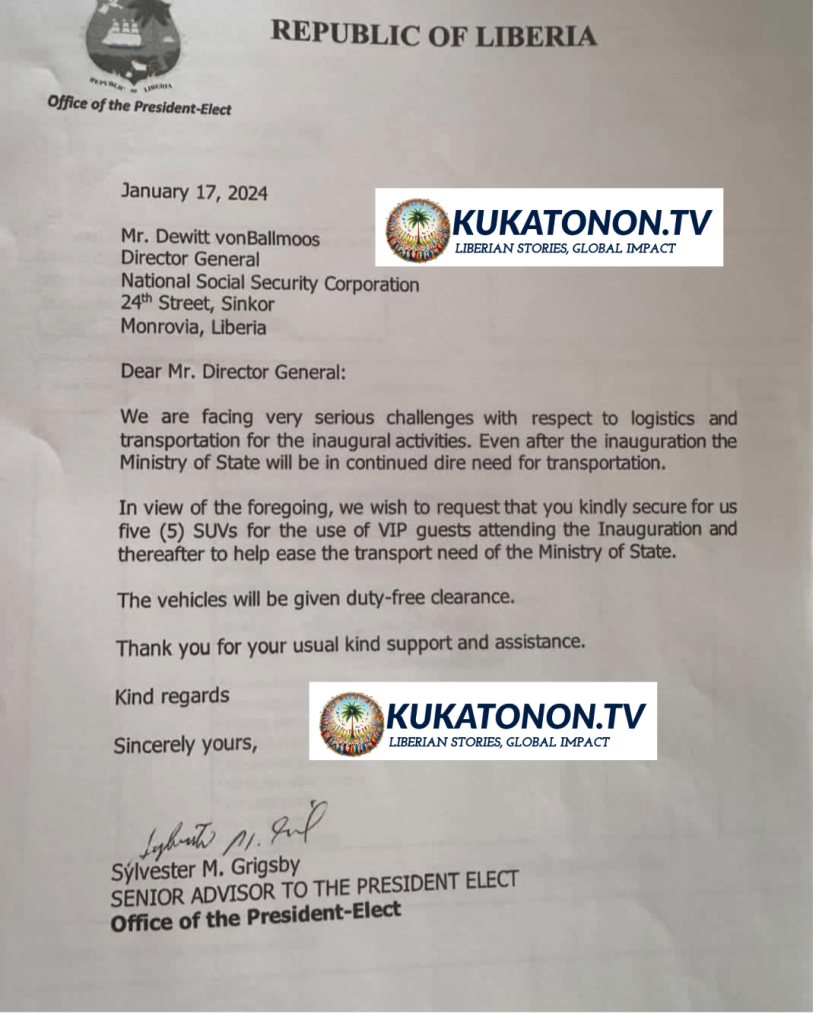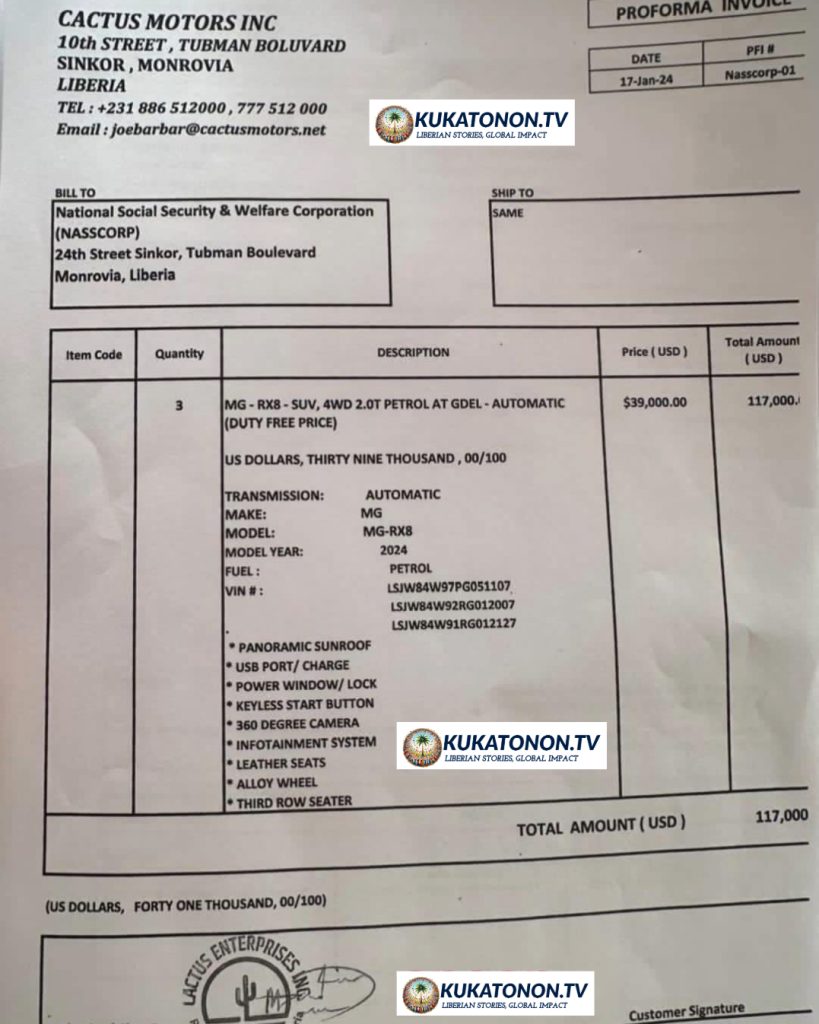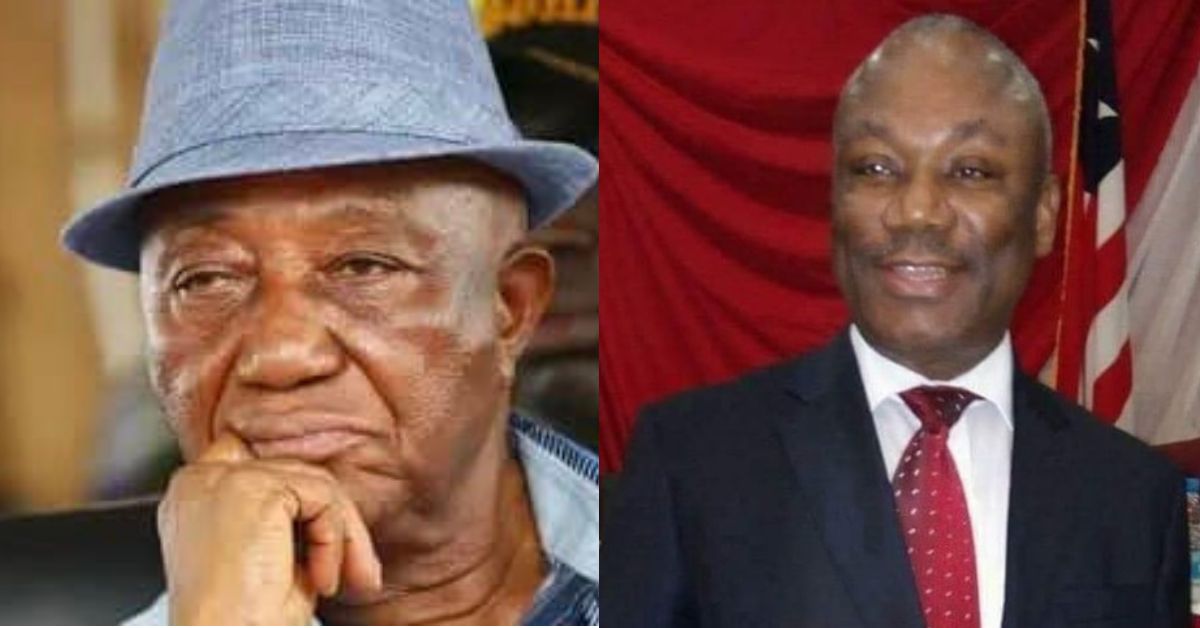In December 2023 and January 2024, Sylvester Grigsby, the now Minister of State for Presidential Affairs, has come under scrutiny for allegedly directing the National Social Security and Welfare Corporation (NASSCORP) to purchase five new SUV vehicles for the use outside official functions. This alleged directive took place before Grigsby had officially assumed his position as official of government, raising questions about the propriety of his actions and the use of state resources. The acquisition of these vehicles, purportedly valued between $117 thousand dollars, has sparked public concern and calls for accountability, given Liberia’s ongoing struggles with corruption and economic challenges.
A letter between Mr. Grigsby and a local banking institution available to the public reads in part: “I extend my warm compliments and best wishes for the New Year. Based on a request from the Transitional team for assistance to facilitate logistics arrangements during the upcoming inauguration program, NASSCORP has agreed and arranged to purchase a Land Cruiser vehicle from CICA Motors with a deferred payment of 30- 45 days (e.g. March 15,2024). CICA is requiring that we secure and provide them a Payment Guarantee from our bankers in order to be able to effect the sale of the vehicle to NASSCORP on such basis. NASSCORP therefore would like to request SI Bank to proceed to issue the requisite Payment Guarantee on our behalf to CICA Motor for the amount of US$117,000.00 (0ne hundred Seventeen Thousand United States Dollars) to be paid by March 15, 2024. Copy of the invoice for the Toyota Land Cruiser 300 LC300 provided by CICA Motors is herewith attached.”
The alleged directive by Minister Sylvester Grigsby for NASSCORP to purchase five new SUV vehicles before officially assuming office endangers pensioners’ money by potentially misusing funds that are intended for social security and welfare purposes. NASSCORP’s resources, which include contributions from pensioners, are meant to provide financial security and benefits to retirees and other beneficiaries. If these funds are diverted or misallocated for unauthorized expenditures, such as purchasing luxury vehicles for political leaders, it compromises the financial stability and trust in the pension system, ultimately risking the well-being of pensioners who rely on these funds for their livelihood.


Despite these allegations, President Joseph N. Boakai has remained notably silent on the matter. Since his inauguration on January 15, 2024, President Boakai has yet to address the accusations against Grigsby publicly or take any visible action to investigate or reprimand him. This lack of response has not gone unnoticed, with critics arguing that it undermines the President’s commitment to combating corruption, a key promise during his campaign. The President’s silence is particularly striking given the gravity of the accusations and the potential misuse of public funds.
The allegations against Grigsby, if proven true, suggest a breach of trust and a misuse of public office for personal or political gain. Such actions would contradict the principles of transparency and accountability that President Boakai’s administration purportedly stands for. The absence of a firm response from the President could be interpreted as tacit approval or, at the very least, a reluctance to confront corruption within his own ranks. This situation poses a significant test for the new administration, which has promised to uphold the rule of law and good governance.
The implications of President Boakai’s inaction extend beyond the immediate controversy. It raises broader concerns about the administration’s ability and willingness to tackle corruption effectively. In a country where corruption has long plagued public institutions and eroded public trust, any sign of tolerance or leniency towards such behavior can have far-reaching consequences. It can discourage whistleblowers, embolden corrupt officials, and erode the public’s confidence in the government’s commitment to reform.
To restore public trust and demonstrate his administration’s sincerity in fighting corruption, President Boakai must take decisive action. This could include launching an independent investigation into the allegations against Grigsby, ensuring that any findings are made public, and holding those responsible accountable, regardless of their position. Additionally, the administration should strengthen mechanisms for transparency and oversight within the government to prevent similar incidents in the future. Such steps would signal a serious commitment to tackling corruption and set a precedent for accountability.
Furthermore, President Boakai could use this opportunity to reaffirm his administration’s anti-corruption agenda and outline specific policies aimed at strengthening institutional integrity. This might involve reforms in procurement processes, public sector audits, and the empowerment of anti-corruption agencies. By doing so, the President can demonstrate that his administration is not only reactive to allegations but proactive in preventing corruption and promoting good governance.

Dr. Clarence R. Pearson, Sr. is a Liberian clergy and social scientist with strong interest in advancing global peace, human rights, a safe planet, and social equity. He holds a BA in Theology, and MA with distinction from the Kofi Annan Institute for Conflict Transformation, University of Liberia. He also graduated with honor from the Louisiana Baptist University and Seminary, Shreveport, Louisiana, USA with A PhD in Psychology and Counseling. Dr. Pearson is a social researcher, an educator, and an author. He has over 29 years of practical professional experience in post-conflict peace-building, recovery, and development with emphasis in both the public and private sector.

